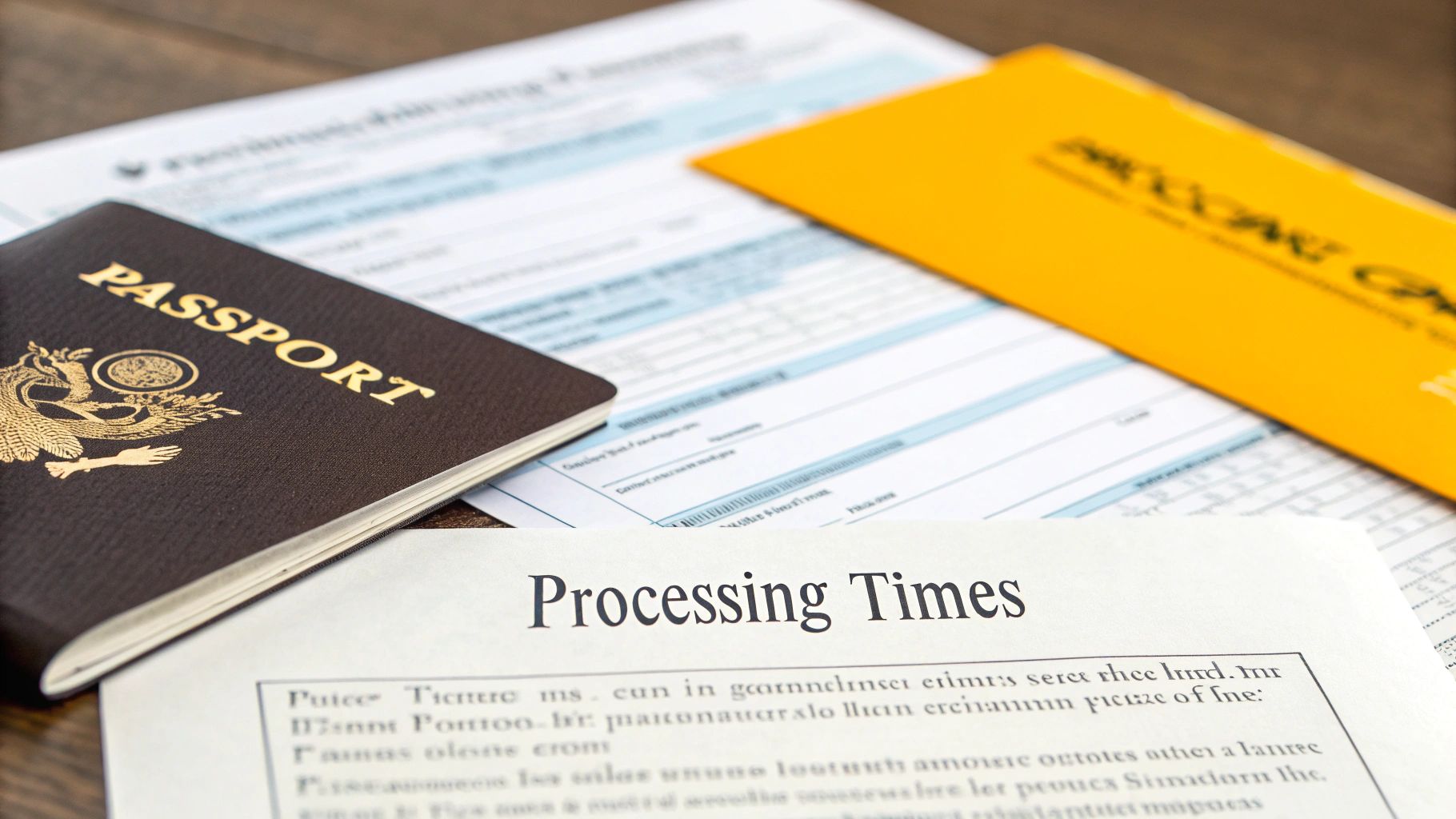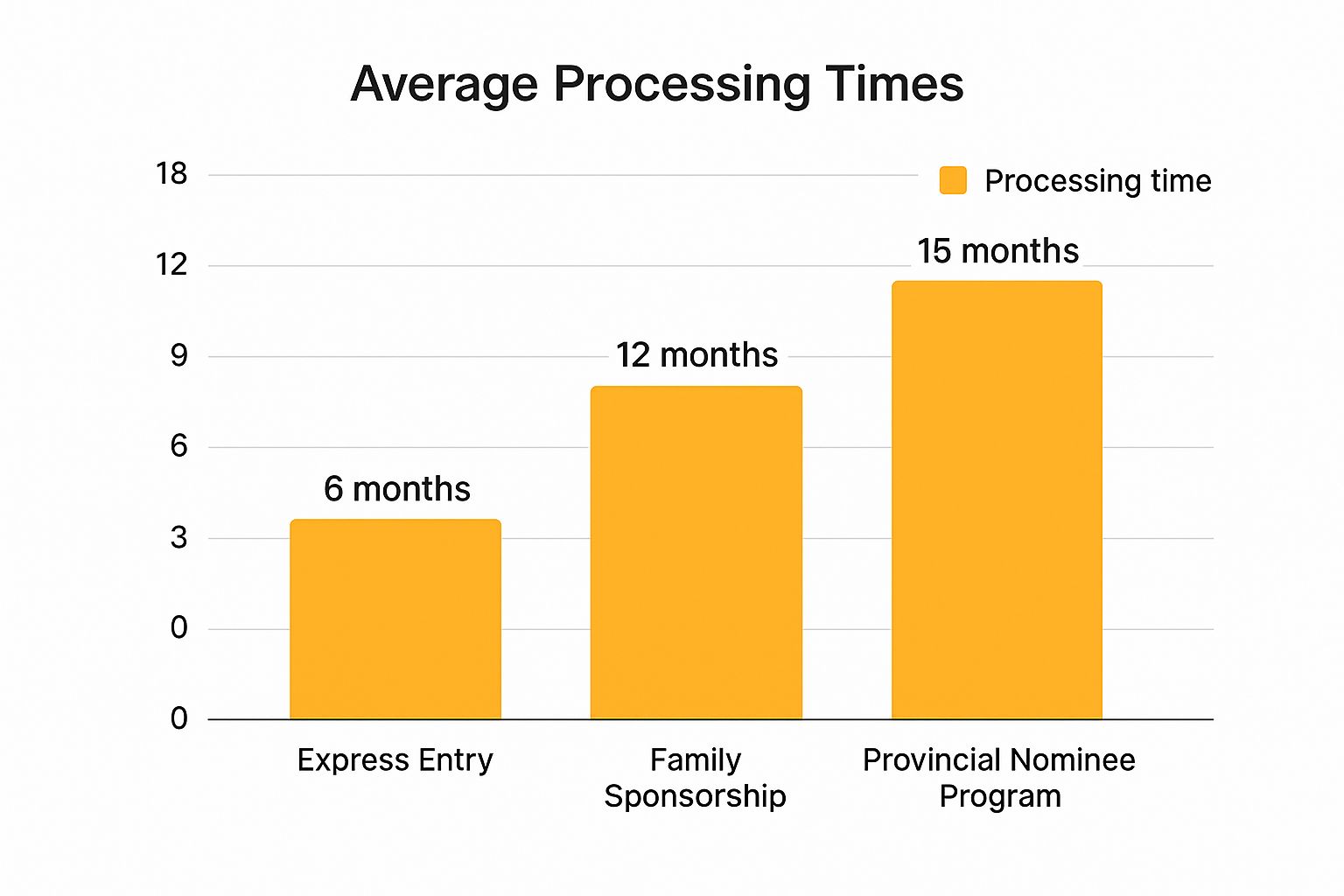A Guide to Canadian Immigration Processing Times
Waiting for a decision on your Canadian immigration application can be one of the most stressful parts of the entire journey. It’s important to remember that Canadian immigration processing times aren’t a guarantee of when you’ll get an answer. Instead, they’re an estimate based on how long it took Immigration, Refugees and Citizenship Canada (IRCC) to process 80% of similar applications in the past.
Decoding IRCC Processing Times

That period after you hit “submit” can feel like a complete black box. You’ve painstakingly gathered your documents, filled out every form, and now… you wait. So, what do those numbers on the Immigration, Refugees and Citizenship Canada (IRCC) website actually mean? Getting a handle on this is the key to managing your expectations.
Think of IRCC as a massive, bustling kitchen. A simple order, like a straightforward visitor visa, is often quick to prepare. A complex, multi-course meal, like a permanent residency application, involves a lot more steps, checks, and time to get just right. The numbers you see online are really just a look back at how long past “orders” took to leave that kitchen.
What Is a Processing Time Estimate
The official figures you see from IRCC are based on historical data—they are not a personal countdown clock for your file. They’re calculated by looking at the time it took to finalize 80% of applications in the same category over the last six months. That also means 20% of applications took even longer to process.
This backward-looking approach has a few big implications for you:
- It’s an average, not a deadline: Your specific application could easily be faster or slower.
- It doesn’t account for current backlogs: If there’s a sudden surge in applications, the whole system slows down. That delay won’t show up in the posted times right away.
- It reflects completed applications: The estimate is based only on files that have already been closed, not the ones currently waiting in line.
Your application’s journey is unique. While the IRCC Processing Time tool provides a valuable benchmark, it is essential to view it as an informed estimate rather than a strict timeline for your individual case.
Using the Official IRCC Tool
The Government of Canada has an online tool to check current processing times. To get your estimate, you simply select the type of application you submitted (like permanent residence, temporary residence, or citizenship) and then drill down to the specific program (e.g., Express Entry, Spousal Sponsorship).
For those of us in Burlington, the Greater Toronto Area, and across Ontario, this tool is the best first step for setting realistic expectations. It gives you a baseline to help you plan, but your real, personal timeline will always come down to the unique details of your file.
What to Expect: Processing Times for Key Immigration Programs
If you’re planning your future in Canada, one of the first questions you’ll ask is, “How long will it take?” The truth is, not all paths to Canadian residency are created equal, and this is especially true when it comes to Canadian immigration processing times. Your wait could be a few months or a few years, depending entirely on the program you choose.
For anyone in Ontario, from downtown Toronto to the suburbs of Burlington, getting a handle on these timelines is the first step in setting realistic expectations. Let’s break down what you can expect from Canada’s most popular immigration streams.
Economic Immigration Streams
Canada’s economic programs are all about attracting skilled individuals who can jump right into the workforce. Because of this, they tend to have some of the quickest processing times.
- Express Entry: Think of this as the fast track for skilled workers. For the main programs under the Express Entry umbrella, like the Canadian Experience Class (CEC) and the Federal Skilled Worker Program (FSWP), the goal is often to process applications in about six months once you receive an Invitation to Apply (ITA).
- Provincial Nominee Programs (PNP): Every province, including Ontario, gets to hand-pick candidates who fill specific gaps in their local job market. The timelines here can be a real mixed bag. If your PNP nomination is linked to Express Entry, things move much faster. A traditional, paper-based PNP application? That will take quite a bit longer.
To give you a clearer picture, let’s look at a snapshot of how some of these timelines compare.
Average IRCC Processing Times For Key Immigration Streams
This table provides a snapshot of estimated processing times for popular Canadian immigration and citizenship applications, based on recent IRCC data.
| Immigration Program | Estimated Processing Time |
|---|---|
| Express Entry (CEC) | 5 months |
| Express Entry (FSWP) | 7 months |
| Spousal Sponsorship | 12-24 months |
| Start-up Visa | 51 months |
These numbers, based on recent data from July 2025, show just how much things can vary. It’s a good reminder that “average” is just a guideline, and your individual experience may differ.

As you can see, Express Entry remains the quickest route among these economic streams, while specialized programs like the Start-Up Visa require a much longer-term plan, with an average wait of 51 months.
Family Sponsorship and Other Key Programs
Reuniting with family is a core part of Canada’s immigration philosophy, but these applications require a different level of scrutiny, which means they take more time.
Sponsoring a spouse, partner, or parent isn’t just about filling out forms; it’s about proving the relationship is genuine. IRCC officers do their due diligence, which is why these applications typically take somewhere between 12 to 24 months to process.
It’s crucial to remember that these are just estimates. For example, recent data from July 2025 shows the average for a Canadian Experience Class application has shifted to 5 months, while the Federal Skilled Worker Program is now closer to 7 months. You’ll want to regularly check the most recent updates to see how these figures are changing.
Temporary Residence Applications
Not everyone is applying for permanent residency right away. Applications for temporary status, like work or study permits, are incredibly common, but their processing times can be unpredictable.
The biggest factors here are where you’re applying from and which visa office is handling your file. A work permit submitted from within Canada could be approved in a few weeks. The same application from overseas might take several months.
Study permit timelines also swing wildly, especially with the surge of applications before the September and January school terms. Life’s unexpected turns can also affect your plans. If you find yourself dealing with other legal issues while you wait, it’s always wise to be prepared. For instance, if you’re involved in a collision, you can learn more about Ontario’s car accident law in our detailed guide. Staying on top of all aspects of your life in Canada is the best way to ensure a smooth journey.
Official Estimates vs. Real-World Wait Times

Have you ever checked the official IRCC website for Canadian immigration processing times, only to hear a completely different story from a friend or on an online forum? This gap between what the government posts and what people actually experience is a common source of anxiety for many aspiring Canadians. It’s a frustrating but very real part of the process.
Think of the IRCC’s posted times as a look in the rearview mirror—they tell you what has already happened, not what’s on the road ahead. Those numbers are historical averages. On the other hand, the real-world wait times you hear about are like a live traffic report, reflecting current application volumes, sudden policy changes, and any backlogs piling up at processing centres right now.
Why the Numbers Don’t Always Match
The official estimates from IRCC are based on how long it took to finalize 80% of applications in the past. This method gives a solid historical baseline, but it can’t always predict a sudden spike in new applications or account for unexpected delays. It’s a reliable guide, but it’s definitely not a personalized forecast for your specific file.
This is where crowdsourced data from other applicants comes in. Community-driven platforms can offer a ground-level view of what’s happening in real time. They often spot bottlenecks or new trends long before the official government numbers catch up, giving you a much more current perspective.
The key takeaway is that both sources have value. Use the official IRCC estimate as a stable, long-term benchmark, but check real-world data from fellow applicants for immediate, on-the-ground insight into what’s happening today.
For example, third-party data can reveal how processing is trending in the current quarter. A popular independent tracker, which relies on user-submitted cases, recorded an average of 164 days (about 5.5 months) for approvals in the second quarter of 2025 (April to June). This was a slight increase from the first quarter, hinting at a small slowdown that official estimates might not show yet. You can find more of these real-world insights in their detailed reports.
Understanding this difference is crucial for applicants across Ontario, from our home base in Burlington to the broader GTA. It helps you build a more flexible and realistic timeline for your future. While you’re waiting, it’s also smart to make sure other parts of your life are in order. For instance, if you’re already employed in Canada, understanding your rights under the Employment Standards Act regarding termination is incredibly important. By combining official data with real-time community insights, you can paint a much clearer picture of your immigration journey.
Factors That Influence Your Application Timeline

Ever wonder why one person’s application seems to fly through the system while another gets stuck for months? The truth is, no two immigration files are exactly the same, and several key factors have a direct impact on your personal Canadian immigration processing times. Knowing what these variables are helps you understand why the official averages are really just a starting point.
Think of an application as a package going through a massive postal system. A standard envelope with a perfectly clear address will get to its destination quickly. But an oversized package with a smudged label? That requires extra handling and verification at every single step, slowing down its whole journey. Your immigration file is no different—its unique characteristics determine how smoothly it can move through IRCC’s workflow.
The Application Itself: Your Biggest Controllable Factor
The single biggest factor you can control is the quality of the application you submit. An IRCC officer wants to see what they call a “decision-ready” file, which is one that is perfectly clear, complete, and easy to verify.
Some of the most common mistakes that cause immediate delays include:
- Missing Signatures: It sounds simple, but forgetting to sign even one form can get your entire package returned, forcing you to start all over again at the back of the line.
- Incomplete Information: Leaving fields blank or giving vague answers forces an officer to stop everything and issue a Request for Further Information (RFI). Your file is effectively paused until they receive your response.
- Poorly Scanned Documents: If a bank statement or reference letter is blurry, cut off, or unreadable, it can’t be verified. This will absolutely cause a delay.
Your goal should be to submit a file that leaves no questions unanswered. A meticulously prepared application is the single most effective way to avoid unnecessary slowdowns and keep your file moving forward.
External Factors Beyond Your Control
Of course, even a perfect application can be affected by external variables. These are the elements you can’t really change but should definitely be aware of.
Country of Application and Visa Office Where you apply from matters—a lot. The specific visa office responsible for your country or region has its own workload, staffing levels, and backlog. For instance, many applicants in Ontario might have their files processed in Mississauga or Etobicoke, but international applications are handled by embassies and consulates around the world. Verifying documents or conducting security checks can be much faster in some countries than in others, which directly influences your wait time.
Application Volume and Complexity Sometimes, a specific program experiences a sudden surge in popularity. This can create a bottleneck that slows down the processing for everyone in that queue. On top of that, if your case has complex admissibility issues—like a past criminal record, a medical concern, or intricate family relationships—it will automatically be flagged for a more detailed review by a senior officer. These kinds of complications can easily add months to the standard processing time.
Navigating government systems correctly is crucial, whether for immigration or other important matters. For example, learning how to apply for CPP disability benefits is another area where understanding the process is key to a successful outcome.
Taking Control of Your Application Journey
Let’s be honest: waiting for a decision from IRCC is one of the most stressful parts of immigrating to Canada. It can feel like you’ve sent your life’s details into a black hole. But you have more power than you think. By being proactive, you can stay on top of your file and help prevent the kind of simple mistakes that cause major delays.
It’s all about shifting your mindset from passively waiting to actively managing your application. This means knowing exactly where to find updates, understanding what they mean, and knowing how—and when—to respond.
Staying on Top of Your File
Your best friend in this process is your official IRCC secure account. Make a habit of checking it regularly. This online portal is your direct window into what’s happening with your case, but you need to learn its language. Get familiar with the different status updates, like “in progress” or “decision made,” so you know precisely where you stand.
But being proactive is more than just looking. It means taking specific actions.
- Respond Immediately: If IRCC sends you a Request for Further Information (RFI), drop everything. This is your top priority. Any delay in your response brings your entire application to a dead stop.
- Keep Your Info Current: Life happens. Did you get a new passport? Get married? Have a baby? You are required to notify IRCC of these major life changes. Keeping your file accurate prevents serious problems down the road.
- Use the Webform Wisely: The IRCC webform isn’t for asking “are we there yet?” Use it for important reasons, like if your application has sailed past the standard canadian immigration processing times or if you need to report a critical update that can’t be done through your account.
The wait is tough, there’s no doubt about it. But proactive management is the best tool you have. By responding quickly to requests and keeping your information up-to-date, you give your application the best possible chance for a smooth journey.
As we’ve seen recently, processing times are always in flux, shifting with government priorities and the sheer number of applications. For instance, between April and August 2025, the Express Entry Provincial Nominee Program (PNP) sped up to 6 months, while the Federal Skilled Worker Program (FSWP) slowed to 6-7 months. Niche streams like the Start-Up Visa are still taking over 40 months, and even getting a new PR card now takes around 50 days. These constant changes really highlight why it’s so important to manage the parts of the process you can actually control. You can see more on these August 2025 IRCC processing time updates.
If you’re feeling lost or just aren’t sure how to handle a specific request from IRCC, getting professional advice can be a game-changer. It might be worth exploring your options for an immigration lawyer near me with a free consultation. Taking these steps is how you do everything in your power to pave the way for a timely, positive outcome.
Common Questions About Immigration Timelines
Waiting for a decision on your Canadian immigration application can be a nerve-wracking experience, and it’s completely normal to have questions swirling in your mind. We hear these same questions often from our clients in Burlington, the GTA, and across all of Ontario. Let’s tackle some of the most common ones head-on.
Why Is My Application Taking Longer Than the Estimate?
It’s incredibly frustrating when your application sails past the date shown on the IRCC website. The key thing to remember is that the time you see online is an average calculated from 80% of past cases—it’s not a personalized deadline for your file.
So, what could be holding things up? It could be anything from the unique complexities of your situation, the need for more in-depth background checks, or simply a major backlog at the specific visa office handling your file. If your application is significantly overdue, it might be time to send a webform inquiry to IRCC to gently ask for an update.
Can I Speed Up My Application?
Unfortunately, there’s no “fast pass” you can buy to jump the queue. The most powerful thing you can do to speed up the process happens before you even hit submit.
The single best way to avoid delays is to file a complete, accurate, and perfectly organised application from day one. Double-check that every form is signed, every required document is included, and all the information is consistent. If IRCC does send a Request for Further Information (RFI), dropping everything to respond immediately is crucial. For more complex situations, this is where working with an immigration professional really pays off, as they can help ensure your application is “decision-ready” from the moment it lands on an officer’s desk.
The best strategy to shorten your wait is to submit a flawless application. Preventing an officer from having to pause and ask for clarification is the most powerful tool you have to influence your timeline.
Does My Country of Origin Affect Processing Time?
Yes, it absolutely can. The time it takes for IRCC to complete its due diligence—like verifying your work history or running security checks—can change dramatically from one country to another.
The reality is that Canadian visa officers stationed around the world have different levels of access and resources to verify information. While IRCC strives for fairness, these operational differences mean that Canadian immigration processing times can vary for applicants from different countries, even if they’re applying under the exact same program. For even more detailed answers to your questions, you can explore our comprehensive Canadian immigration FAQ page.
What Is the Difference Between a Processing Time and a Service Standard?
These two terms are often used interchangeably, but for IRCC, they mean very different things. Getting the distinction right can help you set realistic expectations.
- Service Standard: Think of this as IRCC’s internal goal. It’s the target they set for themselves to process applications under ideal conditions. It’s what they aim for.
- Processing Time: This isn’t a goal; it’s a historical fact. It tells you how long it actually took them to finalize 80% of applications in the recent past.
When there’s a flood of new applications or cases become unusually complex, the actual processing time often stretches well beyond the service standard. Always look at the processing time for a more grounded estimate of how long you might be waiting.
Navigating the complexities of Canadian immigration requires clear guidance and a steady hand. If you have questions or concerns about your application, the team at UL Lawyers is here to help. Contact us today for a consultation and let us put our expertise to work for you.
Related Resources
Living Will Ontario: A Complete Guide to Advance Directives
Continue reading Living Will Ontario: A Complete Guide to Advance DirectivesPower of Attorney vs Guardianship in Ontario Explained
Continue reading Power of Attorney vs Guardianship in Ontario ExplainedNEED A LAWYER?
We are here 24/7 to address your case. You can speak with a lawyer to request a consultation.
905-744-8888GET STARTED WITH A FREE CONSULTATION
Why Choose UL Lawyers
- Decades of combined experience
- Millions recovered for our clients
- No fee unless we win your case
- 24/7 client support
- Personalized legal strategies